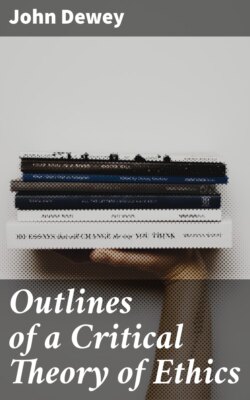Читать книгу Outlines of a Critical Theory of Ethics - Джон Дьюи - Страница 11
На сайте Литреса книга снята с продажи.
VII.
ОглавлениеRelation of Consequences and Conduct.
Do the consequences of an act have anything to do with its morality? We may say no, pointing to the fact that a man who does his best we call good, although the consequences of his act may be far from good. We say his purpose in acting was right, and using as he did all the knowledge that he had, he is not to be blamed for its bad consequences. On the other hand, it is evident that we do take into account consequences in estimating the moral value of an act. Suppose, to use one of Bentham's examples, a person were about to shoot an animal but foresaw that in doing so there was a strong probability that he would also wound some bystander. If he shot and the spectator were wounded, should we not hold the agent morally responsible? Are there not multitudes of intended acts of which we say that we cannot tell whether they are good or bad until we know how they are likely to turn out?
The solution of the difficulty is in recognizing the ambiguity of the term 'consequences'. It may mean the whole outcome of the act. When I speak, I set in motion the air, and its vibrations have, in turn, long chains of effects. Whatever I do must have an endless succession of 'consequences' of which I can know but very little; just so far as, in any act, I am ignorant of the conditions under which it is performed, so far I am ignorant of its consequences. Such consequences are wholly irrelevant morally. They have no more to do with the morality of the act than has the fact that the earth is revolving while the act is taking place.
But we may mean by consequences the foreseen consequences of an act. Just in the degree that any consequence is considered likely to result from an act, just in that degree it gets moral value, for it becomes part of the act itself. The reason that in many cases we cannot judge of the morality of an intended act until we can judge its probable results, is that until we know of these results the action is a mere abstraction, having no content at all. The conceived results constitute the content of the act to be performed. They are not merely relevant to its morality, but are its moral quality. The question is whether any consequence is foreseen, conceived, or not. The foreseen, the ideal consequences are the end of the act, and as such form the motive.
See on Sections 6 and 7, Alexander, Moral Order and Progress, pp. 36-46; on Section 7, Green, Prolegomena to Ethics, pp. 317-323.
